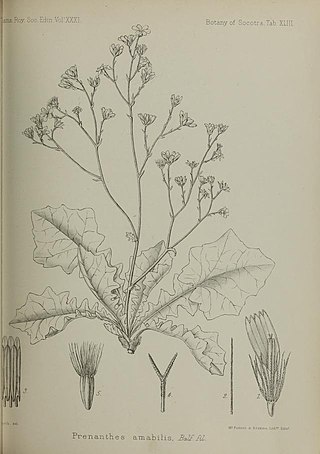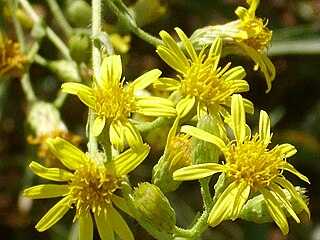
The Gnaphalieae are a tribe of flowering plants in the family Asteraceae. It is most closely related to the tribes Anthemideae, Astereae, and Calenduleae.
Humeocline is a genus of plants in the family Asteraceae, endemic to Madagascar.

Chrysocephalum, known by the common name everlastings for their long life as cut flowers, is a genus of flowering plants in the family Asteraceae. There are nine species, all of which were formerly classified under other genera.

Erythroseris amabilis is a species of flowering plant in the family Asteraceae. It is found only in the Socotra Islands, part of the Republic of Yemen. Its natural habitats are subtropical or tropical dry forests and rocky areas. It is listed as an endangered species by the IUCN under the basionym Prenanthes amabilis.

Pulicaria is a genus of flowering plant in the sunflower family, native to Europe, Asia, and Africa. In North America Pulicaria is known by the common name false fleabane.

Pseudognaphalium is a genus of flowering plants in the sunflower family. Members of the genus are commonly known as cudweeds or rabbit tobacco. They are widespread in tropical and temperate regions of many countries.

Inuleae is a tribe of flowering plants in the subfamily Asteroideae.
Langebergia is a genus of South African flowering plants in the tribe Gnaphalieae within the family Asteraceae.
Oxylaena is a genus of flowering plants in the family Asteraceae. It has been placed in the tribe Calenduleae. The only known species is Oxylaena acicularis, native to the Cape Provinces of South Africa.
Oligothrix is a genus of flowering plants in the groundsel tribe within the sunflower family.

Tessaria is a genus of South American plants in the tribe Inuleae within the family Asteraceae.
Gongylolepis is a genus of South American flowering plants in the family Asteraceae. The following species are recognised by the Global Compositae Checklist:
Mniodes is a genus of South American flowering plants in the tribe Gnaphalieae within the family Asteraceae.
Stenophalium is a genus of Brazilian plants in the tribe Gnaphalieae within the family Asteraceae.

Pentanema is a genus of Asian and African plants in the tribe Inuleae within the family Asteraceae.
Chrysophthalmum is a genus of flowering plants in the family Asteraceae.

Anaphalioides is a genus of flowering plants in the family Asteraceae described as a genus in 1950. They are native to New Zealand and New Guinea.

Anvillea is a genus of flowering plants in the daisy family.
Erythroseris is a genus of African plants in the tribe Cichorieae within the family Asteraceae.
Psednotrichia is a genus of Angolan flowering plants in the groundsel tribe within the sunflower family.









